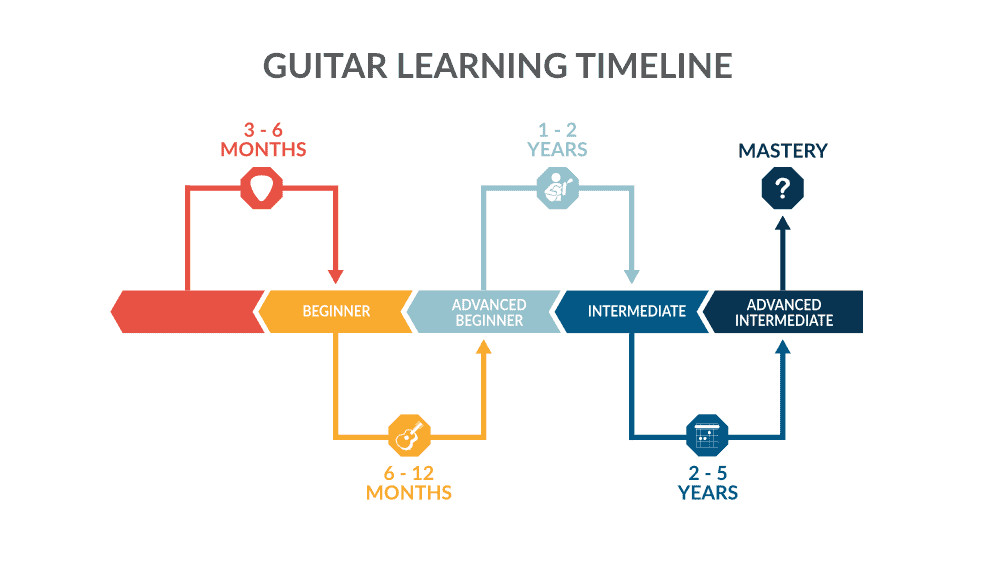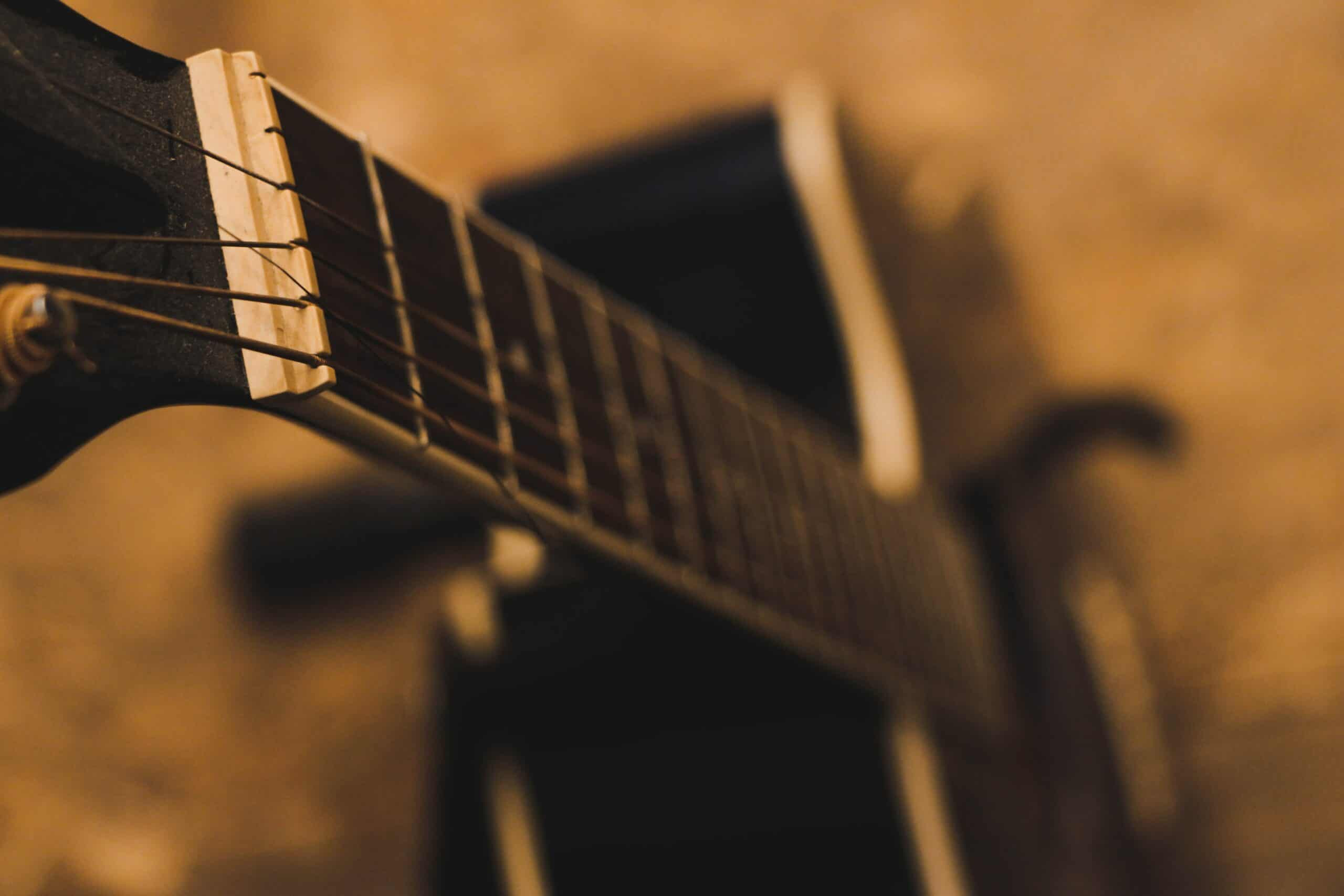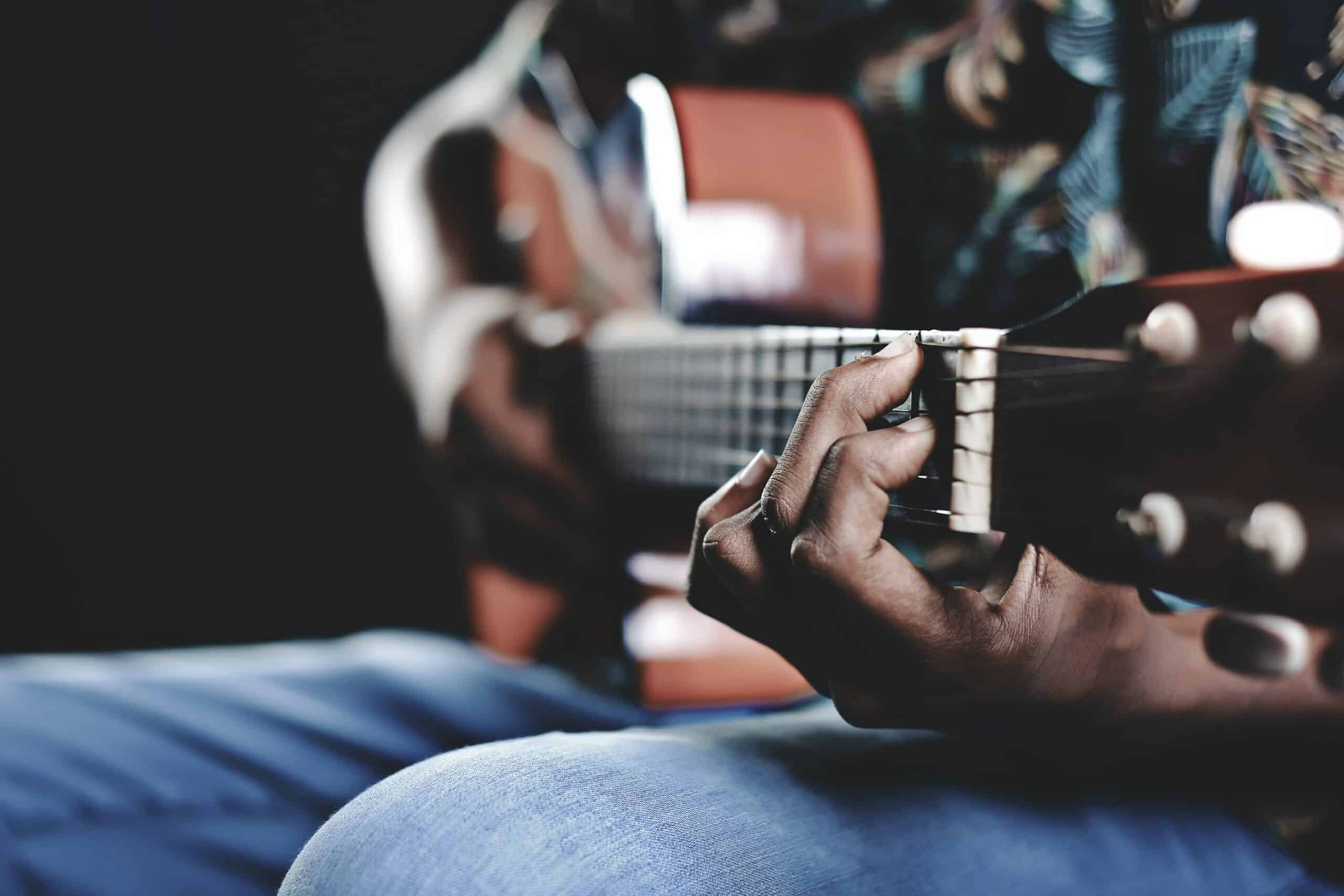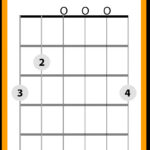Learning to play the guitar is an exciting journey filled with the promise of mastering your favorite songs and maybe even writing your own. If you’re anything like most aspiring guitarists, one of the first questions that pops into your head is: “How long does it take to get good at guitar?”. It’s a valid question, and wanting to know what you’re signing up for and if your efforts will pay off is perfectly natural.
Unfortunately, there’s no simple, one-size-fits-all answer. What “good” means is different for everyone. Instead of a definitive answer, let’s explore a realistic timeline that outlines what you can generally expect at each stage of your guitar learning adventure. Think of this as a roadmap, not a stopwatch.
 Guitar Learning Timeline
Guitar Learning Timeline
Remember, everyone progresses at their own pace. Factors like practice time, natural aptitude, and learning methods all play a role. Even guitar legends like Eddie Van Halen, Jimi Hendrix, and Stevie Ray Vaughan started exactly where you are now. The key is to enjoy the process and celebrate each milestone along the way.
Many beginners also ask, “When will I be able to play actual songs?”. That’s the exciting part, isn’t it? Let’s break down a typical guitar learning timeline to give you a clearer picture of what to expect and when you might be strumming your favorite tunes.
Beginner Phase: 3-6 Months – Building Foundations and Overcoming Initial Hurdles
In the initial 3 to 6 months, most students will start to feel a sense of accomplishment as they begin to play simple chords and songs. This is a crucial phase where you’re laying the groundwork for your guitar journey. However, it’s also often when beginners encounter their first challenges and might feel discouraged.
During this beginner phase, you’re essentially training your hands and ears from scratch. You’ll be developing calluses on your fingertips to reduce finger pain, building hand strength and coordination necessary for chord changes, and grasping fundamental techniques like basic strumming patterns and fingerpicking. You’ll also be introduced to essential music theory concepts and learn to read guitar tabs or chord diagrams.
Unfortunately, it’s common for some aspiring guitarists to lose momentum at this stage. The initial excitement might wane as the reality of practice and effort sets in. Those who persevere, however, tap into an inner drive that propels them to the next level. Consistent practice, even in short bursts, is key to overcoming these initial hurdles and solidifying your foundation.
Advanced Beginner Phase: 6 Months to 1 Year – Navigating the First Plateau and Expanding Skills
After the initial burst of progress in the beginner phase, you might notice that learning guitar feels a bit different between 6 months and a year. It’s common to experience what feels like a plateau. In the beginning, everything was new, leading to rapid and noticeable improvements. Now, while you are still learning and progressing, the gains might seem smaller and less frequent. Your standards are also rising, and you’re tackling more complex techniques and songs.
This phase can be another point where motivation dips for some. The initial novelty may have worn off, and progress seems less dramatic. It’s important to recognize that this feeling is normal. You are still improving, even if it’s in smaller increments. Think of it as refining your skills rather than making leaps and bounds. This is where consistent practice and setting realistic goals become even more crucial.
Those who stick with it through this advanced beginner phase are often rewarded with another significant leap in their playing in the next stage. It’s about pushing through this plateau, trusting the process, and continuing to build upon the fundamentals you’ve already learned.
Intermediate Phase: 1-2 Years – Buckling Down and Seeing the Bigger Picture
 Guitarist playing with focus
Guitarist playing with focus
The intermediate phase, typically between 1 to 2 years of consistent practice, is what we can call the “buckling down” phase. It’s a period of focused effort where you really start to see the fruits of your labor. It’s also when the initial question of “how long will it take to learn guitar” starts to lose its relevance. If you’ve been practicing regularly, you’ve been steadily acquiring new skills and refining your playing without necessarily realizing how far you’ve come.
By this point, you’ve likely mastered most open chords and barre chords. Chord changes become smoother and more natural, and playing guitar starts to feel comfortable and intuitive. You might be exploring scales and confidently playing melodies. You also develop a sharper ear and become more aware of areas where you still need to improve.
This phase is marked by a deeper understanding of guitar playing as a continuous journey. You realize that “learning guitar” isn’t a destination but an ongoing process of growth and discovery. You’re past the initial hurdles and plateaus, and now you’re building real momentum.
Advanced Intermediate Phase: 2-5 Years – Confidence, Musicality, and Genre Exploration
Reaching the advanced intermediate phase, generally after 2 to 5 years of dedicated practice, signifies a significant level of proficiency. Everything you’ve learned so far becomes ingrained and second nature. Barre chords are no longer a challenge, your strumming is fluid and rhythmic, and your chord vocabulary expands to include more complex and interesting voicings. You play with confidence and musicality. You can likely play a wide range of songs from memory and might even be performing in a band or jamming with others.
If you’re interested in lead guitar, you’ve probably started exploring improvisation and lead techniques. You might find that your musical ideas are starting to outpace your technical abilities, creating a healthy tension that fuels further practice and growth. You have a much clearer understanding of what you still want to learn and might be drawn to specific genres like jazz, classical, blues, or fingerstyle guitar.
A significant shift occurs in this phase. The focus moves from constantly chasing new techniques to refining existing skills and developing your musical voice. Practice becomes less of a chore and more of a way to deepen your connection with the instrument and express yourself musically. Looking back 2-5 years, you would likely consider your current self “good” at guitar. However, your perspective has evolved. “Good” becomes less about a fixed point and more about continuous improvement and musical exploration. You’ve embraced guitar playing as a lifelong journey, a source of joy and creative fulfillment.
What Matters Most When Learning Guitar
 Hands playing guitar with natural light
Hands playing guitar with natural light
As Tony Robbins wisely said, “The quality of your questions determines the quality of your life.” This applies perfectly to learning guitar. Focusing on “how long” can actually distract you from the things that truly accelerate your progress and enjoyment of the instrument.
Time itself is not the most important factor. While consistent practice is crucial, what you practice and how you practice are far more impactful. Instead of asking “how long will it take?”, ask yourself more actionable questions like “how can I improve my barre chords?”, “what’s an effective practice routine for my level?”, or “how can I learn to play my favorite song?”. These questions lead to tangible actions and measurable progress.
The idea of being “good” at guitar can also lead to unhelpful comparisons with other players or unrealistic standards. While goals are valuable, comparing yourself to others can be demotivating. Focus on your own journey, celebrate your personal milestones, and enjoy the process of learning and making music.
What are your thoughts on this timeline? What questions do you think are most helpful for becoming a better guitar player? Share your insights in the comments below!
If you’re looking for guidance on what to practice and how to make the most of your practice time, grab a free Guitar Success Checklist. Answer a few quick questions, and you’ll receive a personalized report with recommendations to focus your practice for maximum results.

